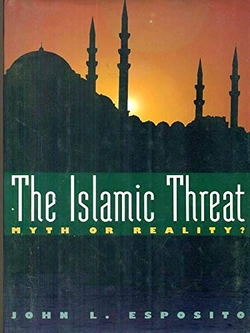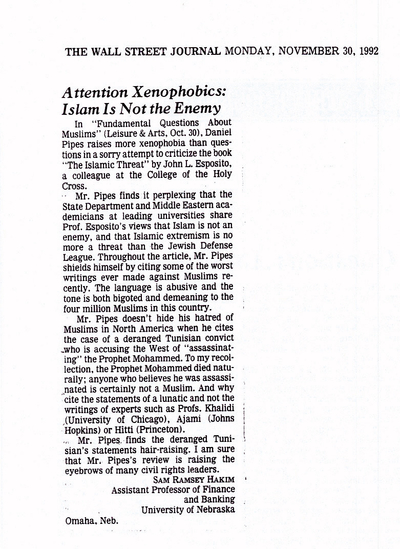 John Esposito, Loyola Professor of Middle Eastern Studies at College of the Holy Cross and one of America's foremost interpreters of Islam, wastes no time in getting to the heart of the matter. His first sentence asks, "Are Islam and the West on an inevitable collision course?" Has fundamentalist Islam replaced Marxism-Leninism as our main enemy?
John Esposito, Loyola Professor of Middle Eastern Studies at College of the Holy Cross and one of America's foremost interpreters of Islam, wastes no time in getting to the heart of the matter. His first sentence asks, "Are Islam and the West on an inevitable collision course?" Has fundamentalist Islam replaced Marxism-Leninism as our main enemy?
The book's final paragraph offers Mr. Esposito's clearest answer: "Islam and most Islamic movements are not necessarily anti-Western, anti-American, or anti-democratic. ... they do not necessarily threaten American interests. Our challenge is to better understand the history and realities of the Muslim world." Elsewhere, he elaborates that this means U.S. government policy should "be carried on in the context in which ideological differences between the West and Islam are recognized and, to the greatest extent possible, accepted or at least tolerated."
With this plea, Mr. Esposito closely anticipated U.S. policy. Edward P. Djerejian, the chief diplomat dealing with the Middle East, recently announced that "the US Government does not view Islam as the next 'ism' confronting the West or threatening world peace."
Are they right? Or do Messrs. Esposito and Djerejian represent that familiar breed of establishment specialist unable to see an enemy until it lands a fist in his face?
Well, yes and yes. They are right in so far as nearly one billion Muslims are deeply divided among themselves. Muslim governments cooperate with the West more often than they threaten it; think of Turkey, Saudi Arabia, and Indonesia. Further, as the Iraqi invasion of Kuwait confirmed, Muslims are not politically unified and never will be. Therefore, anything like a unified jihad against the West lies outside the realm of the plausible. When William S. Lind, a one-time advisor to Gary Hart, worries that Muslim armies might "again be besieging the gates of Vienna," he indulges in pure fantasy.
But the establishment is wrong in so far as it soft-peddles the dangers of fundamentalist Islam, whose radical elements espouse the world's most virulently anti-American ideology. Mr. Esposito mistakenly argues that fundamentalists merely resent current policies; in fact, they hate the entirety of our civilization. Theorists like Sayyid Qutb (an Egyptian) and Abul Ala Mawdudi (a Pakistani) go beyond politics to condemn the very essence of the West's life-its culture, customs, and institutions. The ever-pithy Ayatollah Khomeini put it this way: "We are not afraid of economic sanctions or military intervention. What we are afraid of is Western universities." Symbolic of this sentiment, just last month an influential Iranian religious figure attacked Tehran's doctors for wearing neckties.
Some radical fundamentalists go further and boast they will battle and overcome Europe and America. Typical of this outlook, a Tehran daily claimed in 1990 that "the world movement of Islam" can defeat the West. A Tunisian convicted of setting off bombs in France in 1985-86, killing thirteen, declared to the French judge handling his case, : "I do not renounce my fight against the West which assassinated the Prophet Muhammad. ... We Muslims should kill every last one of you [Westerners]." These hair-raising views are hardly exceptional. But they are notably absent from The Islamic Threat.
Instead, Mr. Esposito focuses on the milder aspects of fundamentalist Islam. Of six pages about Hizbullah - the Lebanese group which tormented and assaulted Americans for nearly a decade through killings and hostage-takings - he devotes just eight words to its methods (Hizbullah "boldly pressed its claims through violence and terrorism"). That's akin to analyzing the philosophical underpinnings of the Soviet Union without mentioning the system's brutalities. If the intent is to reconcile, the effect is to mislead.
The Islamic Threat lacks something else too, something of great importance: Mr. Esposito says not a word about low Western birth-rates and millions of Muslim immigrants to Western Europe and North America. Yet the prospect of cultural submergence is the Islamic threat that alarms European right-wingers even more than Muslim missiles and hostage-takers. Writing in The Spectator, for example, Charles Moore recalled T. S. Eliot's caution of "hooded hordes": "Because of our obstinate refusal to have enough babies, Western European civilisation will start to die at the point when it could have revived with new blood. Then the hooded hordes will win, and the Koran will be taught, as Gibbon famously imagined, in the schools of Oxford." Jean-Marie Le Pen, the French fascist leader, expressed his fears more pungently: "I don't want the French to become like the Red Indians - annihilated by immigration."
Such xenophobia ranks today as probably the single most divisive social issue in Western Europe. It resonates less in the United States, but that may yet change. Patrick Buchanan has already written fearfully about "the whimper of a Moslem child in its cradle" spelling the end of the West. We can look for the issue to grow before long.
Mr. Esposito offers an informed and reasoned discussion of Islam in politics. But he fails to recognize the hostility and ambition of radical fundamentalists and to consider the implications of growing Muslim populations in the West. The Islamic Threat, in other words, provides little guidance to the Islamic threat.
Nov. 30, 1992 update: The Wall Street Journal editors in their wisdom published this response to the above review under the title "Attention Xenophobics: Islam Is Not the Enemy":
In "Fundamental Questions About Muslims" (Leisure & Arts, Oct. 30), Daniel Pipes raises more xenophobia than questions in a sorry attempt to criticize the book The Islamic Threat by John L. Esposito, a colleague at the College of the Holy Cross.
Mr. Pipes finds it perplexing that the State Department and Middle Eastern academicians at leading universities share Prof. Esposito's views that Islam is not an enemy, and that Islamic extremism is no more a threat than the Jewish Defense League. Throughout the article, Mr. Pipes shields himself by citing some of the worst writings ever made against Muslims recently. The language is abusive and the tone is both bigoted and demeaning to the four million Muslims in this country.
Mr. Pipes doesn't hide his hatred of Muslims in North America when he cites the case of a deranged Tunisian convict who is accusing the West of "assassinating" the Prophet Mohammed. To my recollection, the Prophet Mohammed died naturally; anyone who believes he was assassinated is certainly not a Muslim. And why cite the statements of a lunatic and not the writings of experts such as Profs. Khalidi (University of Chicago), Ajami (Johns Hopkins) or Hitti (Princeton).
Mr. Pipes. finds the deranged Tunisian's statements hair-raising. I am sure that Mr. Pipes's review is raising the eyebrows of many civil rights leaders.
SAM RAMSEY HAKIM
Assistant Professor of Finance and Banking
University of Nebraska
Omaha, Neb.
Comment: This letter contains a gem - the statement that "Islamic extremism is no more a threat than the Jewish Defense League."

